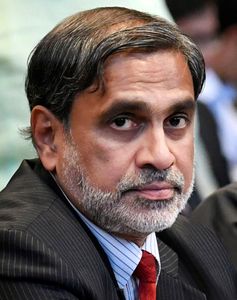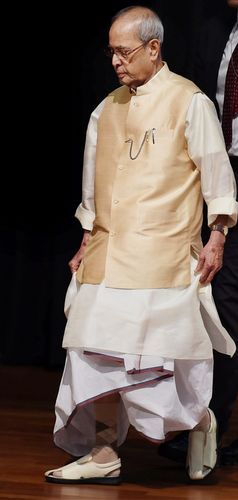OUTWARDLY, PRANAB da was an intimidating figure. A parliamentarian with 43 years of experience, a senior minister who held the most important portfolios in the government, a consensus builder respected across the political spectrum and a scholarly elder known for his memory, quick grasp of issues, flashes of temper and inability to tolerate fools. But, for those who worked with him, Pranab da was a kind, loving father figure with a good sense of humour and fondness for narrating stories from his rich past.
Pranab da liked to describe himself as a village boy from Bengal. He would often tell me how he had to walk miles through paddy fields and puddles to go to school. His memory of events, dates and numbers was legendary. He gave credit to his mother for his prodigious memory as she used to make him recount every evening even the minutest details of all the things he had done that day.
Books were a passion for Pranab da. He would read several at a time. One of the first projects initiated in the Rashtrapati Bhavan during his tenure was the restoration of the library. Once the library was returned to its old glory, he became the first president in over 30 years to visit the room, sit there with his chai, and indulge in his favourite pastime.
A devout Hindu, Pranab da observed rituals and enjoyed going to temples. It was known that nothing and no one could disturb him during his daily morning puja. He rarely missed going to his village for Durga Puja every year. But, he was never orthodox or fundamental. Pranab da never consumed alcohol, but would narrate with impish delight how he joined a debate in Parliament on the inclusion of a reference to soma and sura in NCERT text books. He silenced outraged MPs, pointing out that the description of Durga in the Chandi Path could be interpreted as her being drunk while killing Mahishasur. When this infuriated the MPs even more, Atal Bihari Vajpayee pulled them back saying, “Don’t mess with Pranab da. He knows what he is talking about.”
Helping Pranab da write his memoirs gave me many opportunities to discuss the important moments in his life. I was struck by his stoicism and equanimity when faced with setbacks. I recollect him describing the shock he felt when Rajiv Gandhi dropped him without warning in 1984, although he was the senior-most member of the cabinet. He was dismissive about the accusation that he projected himself as successor to Indira Gandhi following her assassination. His matter of fact response was, “Some Congress leaders asked me what precedents existed and I pointed out the fact that Gulzarilal Nanda succeeded Nehru on his death.” Pranab da at all times had the highest respect for Manmohan Singh, who was junior to him in politics and administration, despite having lost out to him in the prime ministerial race.
Pranab da believed that Parliament made him what he was. It was there he was the happiest. I recall many occasions when he would sit wistfully in front of his television watching debates in Parliament and say, “I wish I was there”. He was fond of describing how Jawaharlal Nehru would go to Parliament whenever possible. He was touched by Prime Minister Narendra Modi’s gesture of prostrating on the steps of Parliament before entering the house for the first time in 2014. In his view, the ability to engage in the cut and thrust of debate was the most important skill of a parliamentarian. He enjoyed narrating stories of his role in various debates and admired Vajpayee for his skills in this regard.
Pranab da was at ease interacting with world leaders like Barack Obama, Vladimir Putin and Xi Jinping and also with those from India’s neighbourhood. I recall Obama saying how happy he was that a person of Pranab da’s wisdom and stature was at the helm of affairs in India. Prime Minister Sheikh Hasina of Bangladesh was like a member of his family.
Pranab da believed the president had an important role to play as the conscience keeper of the nation. He fulfilled this role through the speeches he delivered in which a recurring theme was the need to uphold India’s pluralism and oppose intolerance. Pranab da was second to none in his devotion to duty. The day his wife passed away, he completed all rituals and was back in his office by evening. He would not countenance any suggestion that the meetings be called off.
Pranab da remained concerned about the affairs of the nation till his last breath. He infused in everyone around him an unlimited passion for India, its democracy and the principles of freedom, equality and pluralism. It was fitting that the nation honoured him with its highest civilian award, the Bharat Ratna.
Rajamony is Indian Ambassador to the Netherlands.



